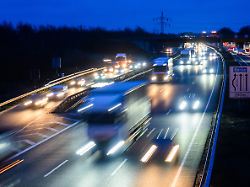“A good compromise”
FDP justifies EU blockade on truck climate targets
February 8, 2024, 6:40 a.m
Listen to article
This audio version was artificially generated. More info | Send feedback
Germany is already delaying an agreement in the EU when it comes to phasing out combustion engines. There are signs of a repeat of the new CO2 standards for trucks: the FDP rejects the planned tightening. Without the consent of the traffic light, the whole project is shaky.
Leading FDP politicians have called for improvements to planned new CO2 emissions standards for buses and trucks in the EU. “We are committed to ensuring that the EU changes course when it comes to technological openness,” said FDP parliamentary group leader Christian Dürr. The FDP believes it is imperative that synthetic fuels be counted towards the so-called fleet limits.
German approval of new CO2 emissions standards for buses and trucks is completely open. It was actually firmly assumed in Brussels that the German government coalition made up of the SPD, Greens and FDP would agree to the plans for the new CO2 emissions standards. A vote was postponed from Wednesday to Friday. It is uncertain whether the votes required for the project will come about without Germany.
Negotiators from the EU states had already agreed in January that there should be new and stricter requirements for so-called fleet limit values. These limits regulate how much climate-damaging CO2 vehicles will be allowed to emit in the future. CO2 emissions from coaches and trucks are expected to fall by 90 percent by 2040 – compared to 2019.
Not the only dispute over EU regulation
Dürr said: “If we don’t give climate-neutral fuels a chance, we will not be able to achieve the climate goals.” In addition, the vehicle industry is of central importance for the economy, not only in Germany, but also in other member states.
FDP parliamentary group deputy Lukas Köhler said that due to the upcoming expansion of EU emissions trading to the transport sector, fleet limits could not make any additional contribution to climate protection anyway. “The FDP has therefore long taken the position that this extremely expensive and completely useless regulation in terms of climate policy can be completely abolished. However, we must recognize that there is currently no democratic majority for this.”
When regulating, climate-friendly fuels must therefore be counted towards the fleet target as well as low-emission engines, says Köhler. “There is apparently not a sufficient majority in the Council for the proposal for very restrictive regulation. A technology-open design would therefore be a good compromise, which would have to be followed by a debate about the abolition of fleet limits and other unnecessary regulations in the age of emissions trading.”
There is also currently a dispute within the traffic light coalition about another planned EU regulation. This is about a planned EU supply chain law. The FDP had vetoed it, so Germany abstained from Friday’s vote at EU level.
